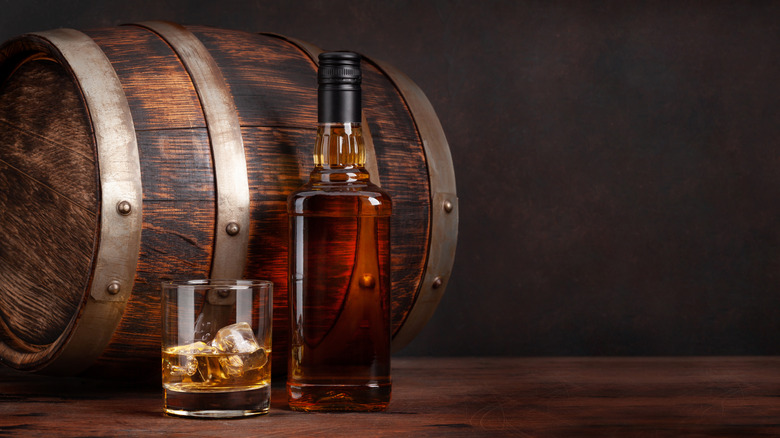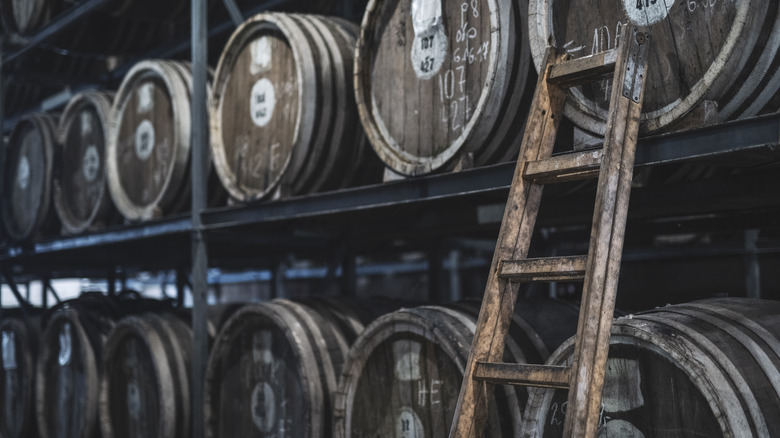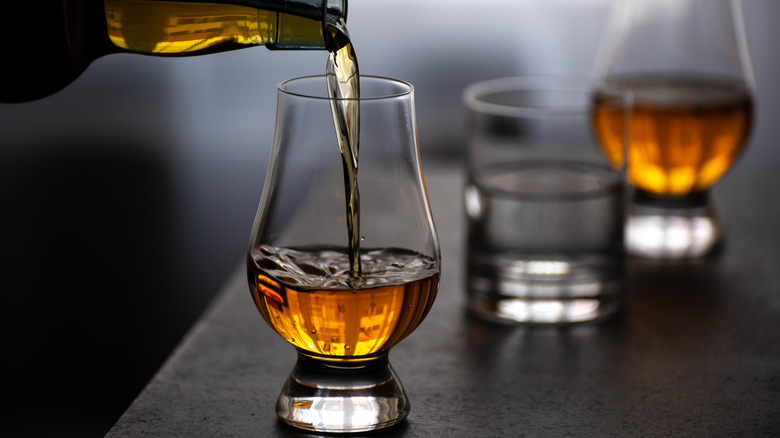What Is The Angel's Share Of Whiskey?
In the world of whiskey, the "angel's share" is a term used as commonly as "mash bill" and "neat," although some may not know exactly what it refers to. The angel's share is the phenomenon that occurs when whiskeys are settled to age and a naturally occurring evaporation takes place as the liquor sits, releasing a lovely scent into the air that's proverbially sacrificed for the angels to enjoy. If you've ever visited and/or toured a whiskey distillery, you've likely come into contact with the elusive angel's share aroma.
The angel's share has been in existence ever since whiskey was created over a millennia ago in Scotland and Ireland. Obviously, this process of evaporation follows Earth's natural laws of the water cycle, but it's also believed in some circles that giving angels their share of whiskey ensures their blessing; thus, they will favor whiskey makers (and consumers) with an excellent product. While the angel's share is mostly associated with whiskey making, it also impacts several other spirits that are aged in barrels, including cognac and brandy. The angel's share isn't just about sacrifice, either, as it turns out. It also happens to help mellow out any unpleasant flavors, resulting in a smoother spirit overall.
What impacts the angel's share?
If you happen to remember the basics of evaporation learned in elementary school, what happens when a liquid like whiskey is left to hang out in barrels for potentially years at a time, is that it will lose some volume. But, what exactly impacts the amount of whiskey sacrificed to the angels? Several factors come into play. For one thing, climate has a huge effect on the amount of evaporation that takes place. In places like Kentucky and Texas where bourbon is largely made in the U.S., temperatures soar much higher than in cool locations like Scotland. Even though whiskeys are kept in temperature-controlled storehouses, hotter climates will still result in higher evaporation.
Similarly, humidity has an impact on the spirit as well. In this kind of environment, water will evaporate first (as opposed to alcohol), so in a humid place like Kentucky, whiskey is often stronger in ABV than varieties from Scotland, where alcohol evaporates first. Naturally, the longer a whiskey ages, the more volume it will lose, so those that are aged for decades will have a larger angel's share — and, as a result, the whiskey left behind will fetch a larger price. In general, bourbon will lose less volume than Scotch since the former is not aged as long.
Finally, the way barrels are stored and stacked while aging impacts the amount of angel's share, too. Vessels lifted off the ground give more room for evaporation to take place while those resting on the floor will give less room for the process.
How much whiskey is lost to the angels?
The amount of whiskey loss isn't set in stone, but it can be estimated using the metric of time. With each passing year, and each batch of whiskey made in any given location, master distillers have come to learn the typical amount of product that's given to the angels. Barreled whiskey will evaporate at its quickest when it's young; according to The Glenlivet, a whiskey cask will sacrifice 3.5 to 4% of its volume every year at the beginning of the aging process, with the amount gradually decreasing as it sits. Keep in mind, The Glenlivet is produced in Scotland where evaporation tends to be far less than in warmer locations. At this given rate, a whisky aged for 20 years could potentially lose a whopping 40% of its volume, which explains why a Scotch aged for two decades is so much more expensive than one aged for three years, for example.
One of the most elusive bourbons in the world, Pappy Van Winkle 20-Year Family Reserve, is held in an aging barrel holding 55 gallons of the whiskey. Over its long aging period, it loses around 50 gallons to the angel's share, leaving a mere five gallons to bottle up. So, it's really no wonder why Pappy is so exceedingly expensive and hard to come by. When it comes down to it, the angel's share of whiskey is a romantic, whimsical interpretation on the natural effects of liquids in relation to temperature. Still, those angels really know how to take the good stuff.



